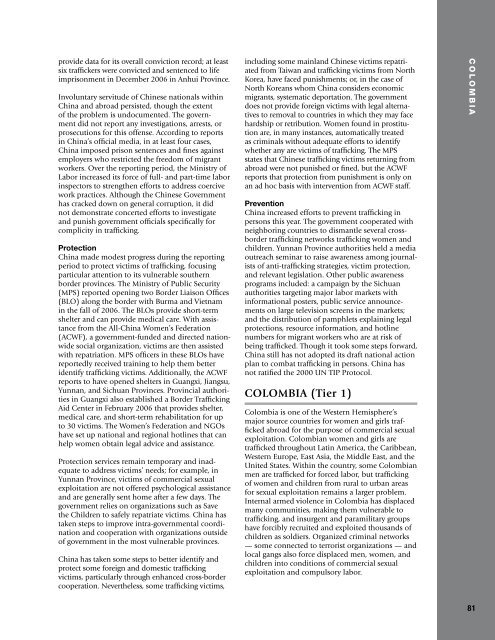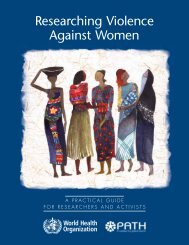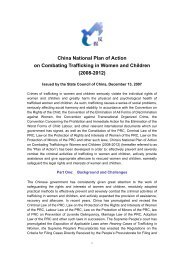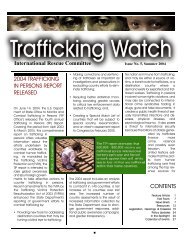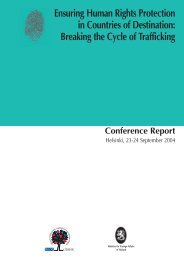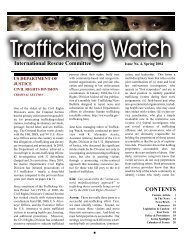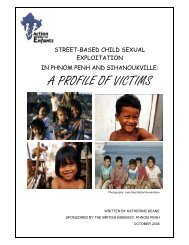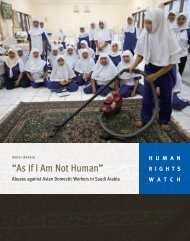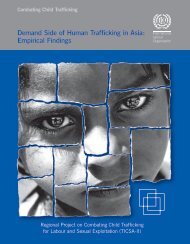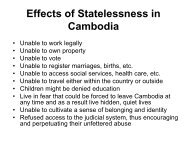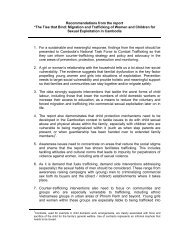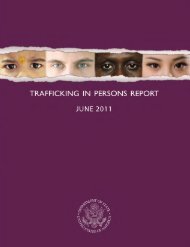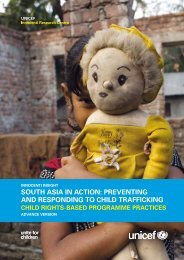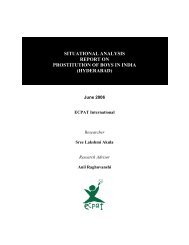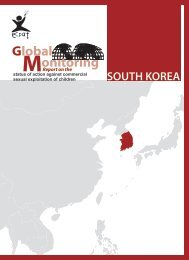2007 Trafficking in Persons Report - Center for Women Policy Studies
2007 Trafficking in Persons Report - Center for Women Policy Studies
2007 Trafficking in Persons Report - Center for Women Policy Studies
You also want an ePaper? Increase the reach of your titles
YUMPU automatically turns print PDFs into web optimized ePapers that Google loves.
provide data <strong>for</strong> its overall conviction record; at least<br />
six traffickers were convicted and sentenced to life<br />
imprisonment <strong>in</strong> December 2006 <strong>in</strong> Anhui Prov<strong>in</strong>ce.<br />
Involuntary servitude of Ch<strong>in</strong>ese nationals with<strong>in</strong><br />
Ch<strong>in</strong>a and abroad persisted, though the extent<br />
of the problem is undocumented. The government<br />
did not report any <strong>in</strong>vestigations, arrests, or<br />
prosecutions <strong>for</strong> this offense. Accord<strong>in</strong>g to reports<br />
<strong>in</strong> Ch<strong>in</strong>a’s official media, <strong>in</strong> at least four cases,<br />
Ch<strong>in</strong>a imposed prison sentences and f<strong>in</strong>es aga<strong>in</strong>st<br />
employers who restricted the freedom of migrant<br />
workers. Over the report<strong>in</strong>g period, the M<strong>in</strong>istry of<br />
Labor <strong>in</strong>creased its <strong>for</strong>ce of full- and part-time labor<br />
<strong>in</strong>spectors to strengthen ef<strong>for</strong>ts to address coercive<br />
work practices. Although the Ch<strong>in</strong>ese Government<br />
has cracked down on general corruption, it did<br />
not demonstrate concerted ef<strong>for</strong>ts to <strong>in</strong>vestigate<br />
and punish government officials specifically <strong>for</strong><br />
complicity <strong>in</strong> traffick<strong>in</strong>g.<br />
Protection<br />
Ch<strong>in</strong>a made modest progress dur<strong>in</strong>g the report<strong>in</strong>g<br />
period to protect victims of traffick<strong>in</strong>g, focus<strong>in</strong>g<br />
particular attention to its vulnerable southern<br />
border prov<strong>in</strong>ces. The M<strong>in</strong>istry of Public Security<br />
(MPS) reported open<strong>in</strong>g two Border Liaison Offices<br />
(BLO) along the border with Burma and Vietnam<br />
<strong>in</strong> the fall of 2006. The BLOs provide short-term<br />
shelter and can provide medical care. With assistance<br />
from the All-Ch<strong>in</strong>a <strong>Women</strong>’s Federation<br />
(ACWF), a government-funded and directed nationwide<br />
social organization, victims are then assisted<br />
with repatriation. MPS officers <strong>in</strong> these BLOs have<br />
reportedly received tra<strong>in</strong><strong>in</strong>g to help them better<br />
identify traffick<strong>in</strong>g victims. Additionally, the ACWF<br />
reports to have opened shelters <strong>in</strong> Guangxi, Jiangsu,<br />
Yunnan, and Sichuan Prov<strong>in</strong>ces. Prov<strong>in</strong>cial authorities<br />
<strong>in</strong> Guangxi also established a Border <strong>Traffick<strong>in</strong>g</strong><br />
Aid <strong>Center</strong> <strong>in</strong> February 2006 that provides shelter,<br />
medical care, and short-term rehabilitation <strong>for</strong> up<br />
to 30 victims. The <strong>Women</strong>’s Federation and NGOs<br />
have set up national and regional hotl<strong>in</strong>es that can<br />
help women obta<strong>in</strong> legal advice and assistance.<br />
Protection services rema<strong>in</strong> temporary and <strong>in</strong>adequate<br />
to address victims’ needs; <strong>for</strong> example, <strong>in</strong><br />
Yunnan Prov<strong>in</strong>ce, victims of commercial sexual<br />
exploitation are not offered psychological assistance<br />
and are generally sent home after a few days. The<br />
government relies on organizations such as Save<br />
the Children to safely repatriate victims. Ch<strong>in</strong>a has<br />
taken steps to improve <strong>in</strong>tra-governmental coord<strong>in</strong>ation<br />
and cooperation with organizations outside<br />
of government <strong>in</strong> the most vulnerable prov<strong>in</strong>ces.<br />
Ch<strong>in</strong>a has taken some steps to better identify and<br />
protect some <strong>for</strong>eign and domestic traffick<strong>in</strong>g<br />
victims, particularly through enhanced cross-border<br />
cooperation. Nevertheless, some traffick<strong>in</strong>g victims,<br />
<strong>in</strong>clud<strong>in</strong>g some ma<strong>in</strong>land Ch<strong>in</strong>ese victims repatriated<br />
from Taiwan and traffick<strong>in</strong>g victims from North<br />
Korea, have faced punishments; or, <strong>in</strong> the case of<br />
North Koreans whom Ch<strong>in</strong>a considers economic<br />
migrants, systematic deportation. The government<br />
does not provide <strong>for</strong>eign victims with legal alternatives<br />
to removal to countries <strong>in</strong> which they may face<br />
hardship or retribution. <strong>Women</strong> found <strong>in</strong> prostitution<br />
are, <strong>in</strong> many <strong>in</strong>stances, automatically treated<br />
as crim<strong>in</strong>als without adequate ef<strong>for</strong>ts to identify<br />
whether any are victims of traffick<strong>in</strong>g. The MPS<br />
states that Ch<strong>in</strong>ese traffick<strong>in</strong>g victims return<strong>in</strong>g from<br />
abroad were not punished or f<strong>in</strong>ed, but the ACWF<br />
reports that protection from punishment is only on<br />
an ad hoc basis with <strong>in</strong>tervention from ACWF staff.<br />
Prevention<br />
Ch<strong>in</strong>a <strong>in</strong>creased ef<strong>for</strong>ts to prevent traffick<strong>in</strong>g <strong>in</strong><br />
persons this year. The government cooperated with<br />
neighbor<strong>in</strong>g countries to dismantle several crossborder<br />
traffick<strong>in</strong>g networks traffick<strong>in</strong>g women and<br />
children. Yunnan Prov<strong>in</strong>ce authorities held a media<br />
outreach sem<strong>in</strong>ar to raise awareness among journalists<br />
of anti-traffick<strong>in</strong>g strategies, victim protection,<br />
and relevant legislation. Other public awareness<br />
programs <strong>in</strong>cluded: a campaign by the Sichuan<br />
authorities target<strong>in</strong>g major labor markets with<br />
<strong>in</strong><strong>for</strong>mational posters, public service announcements<br />
on large television screens <strong>in</strong> the markets;<br />
and the distribution of pamphlets expla<strong>in</strong><strong>in</strong>g legal<br />
protections, resource <strong>in</strong><strong>for</strong>mation, and hotl<strong>in</strong>e<br />
numbers <strong>for</strong> migrant workers who are at risk of<br />
be<strong>in</strong>g trafficked. Though it took some steps <strong>for</strong>ward,<br />
Ch<strong>in</strong>a still has not adopted its draft national action<br />
plan to combat traffick<strong>in</strong>g <strong>in</strong> persons. Ch<strong>in</strong>a has<br />
not ratified the 2000 UN TIP Protocol.<br />
COLOMBIA (Tier 1)<br />
Colombia is one of the Western Hemisphere’s<br />
major source countries <strong>for</strong> women and girls trafficked<br />
abroad <strong>for</strong> the purpose of commercial sexual<br />
exploitation. Colombian women and girls are<br />
trafficked throughout Lat<strong>in</strong> America, the Caribbean,<br />
Western Europe, East Asia, the Middle East, and the<br />
United States. With<strong>in</strong> the country, some Colombian<br />
men are trafficked <strong>for</strong> <strong>for</strong>ced labor, but traffick<strong>in</strong>g<br />
of women and children from rural to urban areas<br />
<strong>for</strong> sexual exploitation rema<strong>in</strong>s a larger problem.<br />
Internal armed violence <strong>in</strong> Colombia has displaced<br />
many communities, mak<strong>in</strong>g them vulnerable to<br />
traffick<strong>in</strong>g, and <strong>in</strong>surgent and paramilitary groups<br />
have <strong>for</strong>cibly recruited and exploited thousands of<br />
children as soldiers. Organized crim<strong>in</strong>al networks<br />
— some connected to terrorist organizations — and<br />
local gangs also <strong>for</strong>ce displaced men, women, and<br />
children <strong>in</strong>to conditions of commercial sexual<br />
exploitation and compulsory labor.<br />
C O L O M B I A<br />
81


